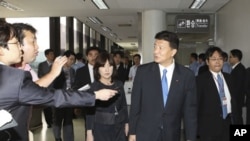A trio of conservative Japanese lawmakers, intending to visit Ulleung island off the eastern Korean coast, was refused entry Monday into South Korea.
The three members of the Japan parliament, known for their hardline views on the territorial dispute with South Korea, were prohibited as expected from getting past the immigration counter at Seoul’s Gimpo airport.
They are pressing their case for Japanese sovereignty over disputed adjacent islets in the Sea of Japan, which Koreans call the East Sea. But even after authorities in Seoul made it clear they would be denied entry, Yoshitaka Shindo, Tomomi Inada and Masahisa Sato boarded a flight in Tokyo.
Just after the group landed in Seoul, Shindo was defiant at the airport, saying they will press their intention to visit Ulleung-do, a South Korean island 90 kilometers west of the disputed rocks:
Shindo says “Takeshima." known as Dokdo in Korean, is Japanese territory. He adds that the two countries need to talk about it as there is a difference of opinions. And, he warns, if the members of parliament are not admitted that itself will become a diplomatic dispute.
Minutes later the three Japanese were escorted by immigration authorities to a waiting room and told that their entry to the country was being prohibited under South Korea’s immigration control law and they would be put back on the same ANA commercial airliner returning to Tokyo.
That led to a nine-hour standoff with the Japanese refusing to leave, insisting they be given a sufficient explanation why they were not allowed to enter South Korea. The politicians finally boarded a Monday evening flight back to Japan.
South Korean Foreign Ministry spokesman Cho Byung-jae called the travel ban unprecedented, but also said that Seoul had “strongly advised” Tokyo to dissuade them from flying here.
“[The] Japanese parliamentarians will not be allowed to come into Korea this time because we think that the stated purpose of their visit is not going to help our bilateral relationship," he said. "And, also, we have some problem in providing security for them."
In Seoul on Monday, an angry group of South Koreans protested in front of Japan’s Embassy and burned Japanese flags and photographs of the three lawmakers.
(Reuters)
But in Tokyo, Chief Cabinet Secretary Yukio Edano said South Korea’s travel ban on the lawmakers is unacceptable. The Japanese government has asked South Korea to reconsider the ban.
Shindo’s maternal grandfather was an Imperial Japanese Army general. Inada, a former lawyer, has generated controversy by denying that Japanese soldiers in Nanjing, China, committed massacres and rapes. Sato, a former member of the Japanese Self Defense Force, has written that Japan’s early 20th century colonial rule over the Korean peninsula was “legal.”
Media reports also say a right-wing Japanese professor was refused entry into South Korea after arriving on a flight Sunday evening at Incheon International Airport. Shimojo Masao of Takushoku University had visited here in 2006 to debate South Korean academics about the sovereignty issue of the disputed maritime territory.
The Japanese said they intended to visit Ulleung-do, which serves as the South Korean administrative and military base for two tiny islands claimed by Seoul and Tokyo. Ulleung-do is a popular tourist spot about 120 kilometers off the east coast of the Korean peninsula.
The sovereignty dispute about nearby Dokdo is an emotional issue for South Koreans.
The planned visit by the Japanese lawmakers was interpreted as a provocation here in a country where bitter memories linger of Japan’s brutal occupation of Korea.
That has kept the tiny islands, known internationally as the Liancourt Rocks, as a significant diplomatic irritant between Seoul and Tokyo since South Korea began posting members of its coast guard there in 1954.




